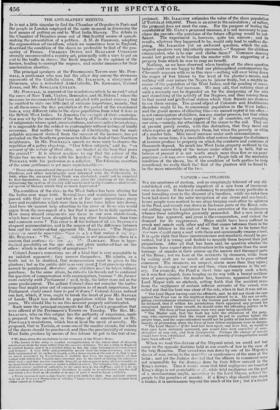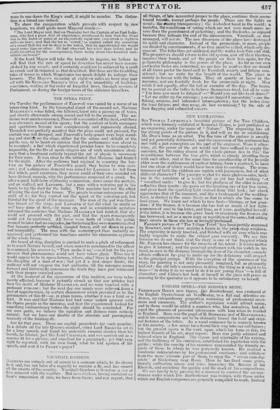• VAPOUR t) TSUS STEAMING.
• WE are creatures of custom, and as surprisingly tolerant of any old- established evil, as violently impatient of a new form of inconveni- ence or danger. It has been customary to regulate every particular in land travelling even to the disposal of a bandbox, while no rules have been laid down for the safer navigation of our rivers and sea-board ; hence people were content to see ships banging each other to splinters in the Pool, and vessels run down in thelower parts of the River, with- out calling upon the Legislature for laws corrective of the negligences whence these catastrophes generally proceeded. But a new mode of danger has appeared, and great isthe exaggeration, and violent the demand • for its suppression. Ships might have been suffered to crush and smash each 'other and all that comes between them in the Pool dd libitum to the end of time, but it is not to be borne that tee ers should carry a surf with them and occasionally swamp a boat. It is quite right that these inconveniences and mischiefs should be pre- vented, but it is wrong and foolish to magnify them beyond their just proportions. After all that has been said, we question whether the steamers have caused more destruction in the aggregate than the same tonnage of smacks in their course up the narrow and thronged parts
of the ; but we hear of the accidents by steamers, while those by sailing craft are so much of ancient custom as to pass without comment. The steamers, we suspect, alarm more than they injure; but they do swamp a boat now and then, when clamorous is the out- cry. For example, the Pearl a short time ago nearly sank a boat, as it was first alleged, from keeping on its way with a brutal reckless- ness of consequences : the master has, however, appeared before the Lord Mayor with an affidavit, setting forth that the accident arose from the negligence of certain inferior servants of the vessel, who called out that the boat was clear of the side, when in fact it was not so.
" The Lord Mayor having read the affidavit, said, he did not think the case against the Pearl was in the slightest degree altered by it. He saw no miti- gating circumstances whatsoever in the version just submitted to him ; and he declared, that if within his jurisdiction there appeared any ground for complaint against those vessels, he should order the offending parties to be indicted. The lives of four persons were very near being sacrificed.
" The Master said, that the fault lay with the attendant of the gang- way, who represented that the vessel might be put in motion before the proper time, and the superintendent would not be guilty of the horrible inhu- manity of proceeding when the lives of four fellow-creatures were in danger.
" The Lord Mayor= If the boat had been upset, and lives lost, as would ill that case have certainly occurred, you would have been convicted of man- slaughter at any rate, and been transported. Perhaps the charge of murder would hare been established. At all events, the penalty of transportation would have been affixed.'"
When we read this dictum of the Mayoral mind, we could not but recur to the opposite doctrine held in our courts of law in the case of the brig Rosanna. That vessel was run down by one of his Majestys sloops of war, owing to the stupidihv or carelessness of the man at the helm ; and yet the Judges deciled that the officers in command were not responsible for the damage done by their fellow servant in the King's service. Thus it would seem that fatal negligence on board of King's ships is not punishable at aF, while fatal negligence on the part of a merchantman might, according to the Lord Mayor, subject the people to the penalties of murder. If a King's ship should run down a trader, it is carelessness beyond the reach of the law; but if a trader were to run down the King's craft, it might be murden The distinc- tion is a broad one indeed.-
To show the exaggeration which prevails with respect to ;itew bugaboos, we shall quote more Mayoral words
. .
"The Lord Mayor said, that on Thursday last the Captain of an East India. man, who had a great deal of experience, mentioned to him that the Pearl was in the habit of going 'at an excessively rapid rate, (seventeen or eighteen miles an hour), and that she lay so crank,' as seamen called the condition of a vessel that did not lie deep in the water, that he apprehended she would upset some time or other. He had observed her a few days before, and he really trembled for the consequences, there being about two hundred indi- viduals on board."
If the Lord Mayor will take the trouble to inquire, we believe he will find that the rate of speed he describes has never been accom- plished by any vessel; and it certainly could not be achieved by a craft so crank and ill-trimmed as that described. But these are the twaddling tales of terror in which Magistrates too much delight to indulge their hearers. The Mayor's steaming at eighteen miles an hour May pair oil. with Sir RICHARD BIRNIn's tales of the immobility of hackney- coachmen, waiting at the order of forgetful fares, through sessions of Parliament, or during the foreign tours of the oblivious travellers.



















 Previous page
Previous page